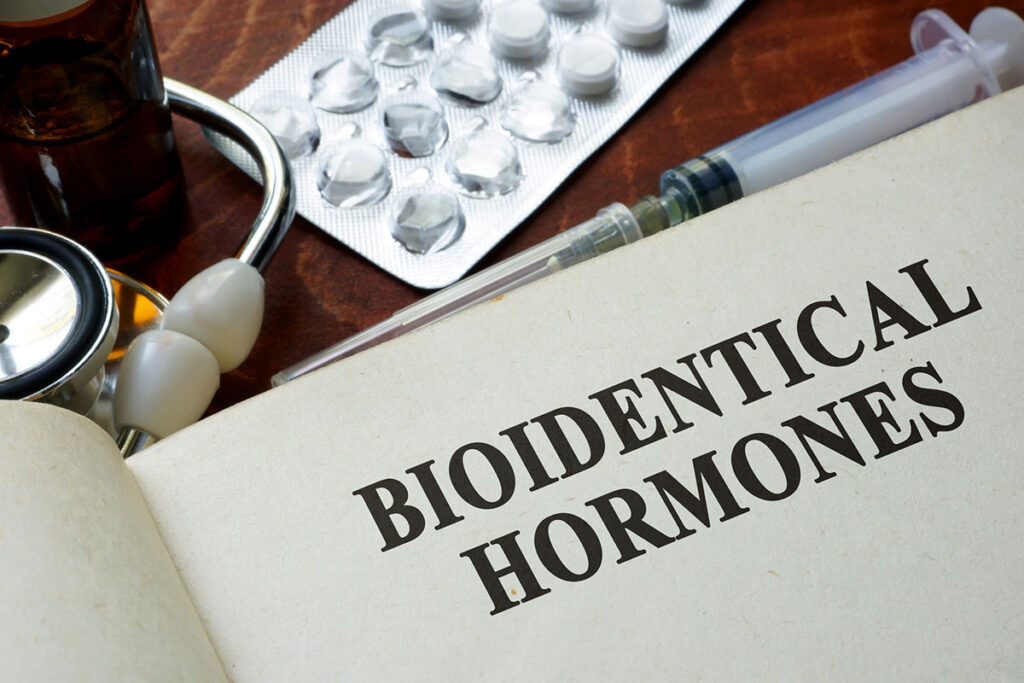Are you looking for alternatives to hormone therapy? They’ve been controversial for more than two decades, giving rise to a plant-based option known as bioidentical hormones. They’re similar to the hormones produced in the body, and well-known celebrities endorse some of these bioidentical products. But, not all bioidentical products are not created equally. It’s important to understand the different types and the advantages and disadvantages of each.
What are bioidentical hormones?
Types of bioidentical hormones
FDA-approved bioidentical hormone therapy
Custom-compounded bioidentical hormone therapy (c-BHT)
Personalized medicine

Unsubstantiated claims
There are many unsubstantiated claims, including that c-BHT is safer than standard hormone therapy.
Most claims lack scientific data to back them up.
C-BHT risks
The FDA does not regulate compounding pharmacies so the therapy preparation can vary dramatically from batch to batch. So, women can overdose or underdose, leading to risks and/or inadequate symptom relief.
Contamination is also a concern.
Without safety testing and regulations, warning labels about the risks of hormone therapy may not be on the packaging.
“Consumers may be lured by the prospect of personalized medicine and avoiding perceived ‘one-size-fits-all’ treatments,” said Donald Mattison, Chief Medical Officer of Risk Sciences International and chair of the committee that wrote the report.
“However, cBHT preparations, across doses and dosage forms, are not supported by a sufficient body of evidence to inform providers and patients of potential benefits and harms. Providers have an obligation to educate patients about the potential risks of using cBHTs, and present a clear rationale if they do need to prescribe them.”
NASEM concluded their widespread use poses a public health concern.
Compounding pharmacies respond
The Alliance for Pharmacy Compounding (APC) said the NASEM study “feels a lot like the movie Groundhog Day, only without Bill Murray for laughs. Which is to say: We’ve seen this sort of thing before.”
APC president, Shawn Hodges, said in the APC statement,
“The purpose of pharmacy compounding is to offer therapies that are not available from a traditional manufacturer. Our role is to help patients whose needs are not met by commercially available medications. Compounding is an art — It’s a drug made for the patient, not the masses. In the context of women’s health, pharmacists for decades have safely compounded specific strengths and dosage forms of hormones to meet each patient’s individual needs. While it’s impossible to conduct extensive drug studies for every possible combination of hormones, there is data beyond what NASEM shared today that substantiates the clinical rationale for use. This is evident by the overwhelmingly positive outcomes that our female patients share with our pharmacists every day.”
The Menopause Society 2022 position on bioidentical hormones
In its latest position statement on hormone therapy, The Menopause Society said compounded hormone therapy should only be considered if a woman can’t tolerate a government-approved therapy “for reasons such as allergies to ingredients in a government-approved hormone therapy formulation or for a dose or formulation not currently available in government-approved therapies.”
While they support shared decision-making for hormones, The Menopause Society says patient preference alone should not be the justification for the use of compounded therapies.
It’s a personal choice
No matter what you decide, know you don’t have to suffer in silence as you go through the menopause journey. You have options, many of which are not hormones.
Don’t focus on what everyone else is doing. Instead, do your research and collaborate with your healthcare practitioner to explore options and determine the best fit for you based on your clinical status, personal and family medical history, and life circumstances.
Bioidentical Hormone Therapy | The Menopause Society
Kohn GE, Rodriguez KM, Hotaling J, Pastuszak AW. The History of Estrogen Therapy. Sex Med Rev. 2019 Jul;7(3):416-421. doi: 10.1016/j.sxmr.2019.03.006. Epub 2019 May 27. PMID: 31147294; PMCID: PMC7334883.
Pattimakiel L, Thacker H. Bioidentical hormone therapy: Clarifying the misconceptions. Current Drug Therapy. 2021, Volume 78, Number 12. doi:10.3949/ccjm.78a.10114
Bioidentical hormones explained – a British Menopause Society video | British Menopause Society
What Does an FDA Black Box Warning Mean? | GoodRx Health
APC’s Official Statement on the NASEM Report | Alliance for Pharmacy Compounding
The 2022 hormone therapy position statement of The Menopause Society. Menopause. The Journal of The Menopause Society. Vol. 29, No. 7, pp. 767-794 DOI: 10.1097/GME.0000000000002028
Pinkerton J. Menopause Matters from The Menopause Society: The Truth About Bioidentical Hormone Therapy. The Female Patient. 2022 Vol 37.
Prescribers Should Restrict the Use of Non-FDA-Approved Compounded Bioidentical Hormones, Except for Specific Medical Circumstances | National Academies Sciences, Engineering, Medicine
You may also like…

Hot Flash Guide: Why They Happen and How to Get Relief
Hot flashes are one of the most common and disruptive symptoms, but they they can feel isolating and even embarrassing. Understand what’s happening in your body and learn about new treatment options.

LYNKUET: A New Option for Hot Flash Relief
A new non-hormonal medication, LYNKUET™ (elinzanetant) offers relief for women+ who experience menopause-related hot flashes. Learn how it works.

Hormone-Free Hot Flash Relief: 12 Non-Hormonal Medications To Try
Want to beat the heat from hot flashes hormone-free? Try these non-hormonal hot flash medications that are FDA-approved or used off-label.

